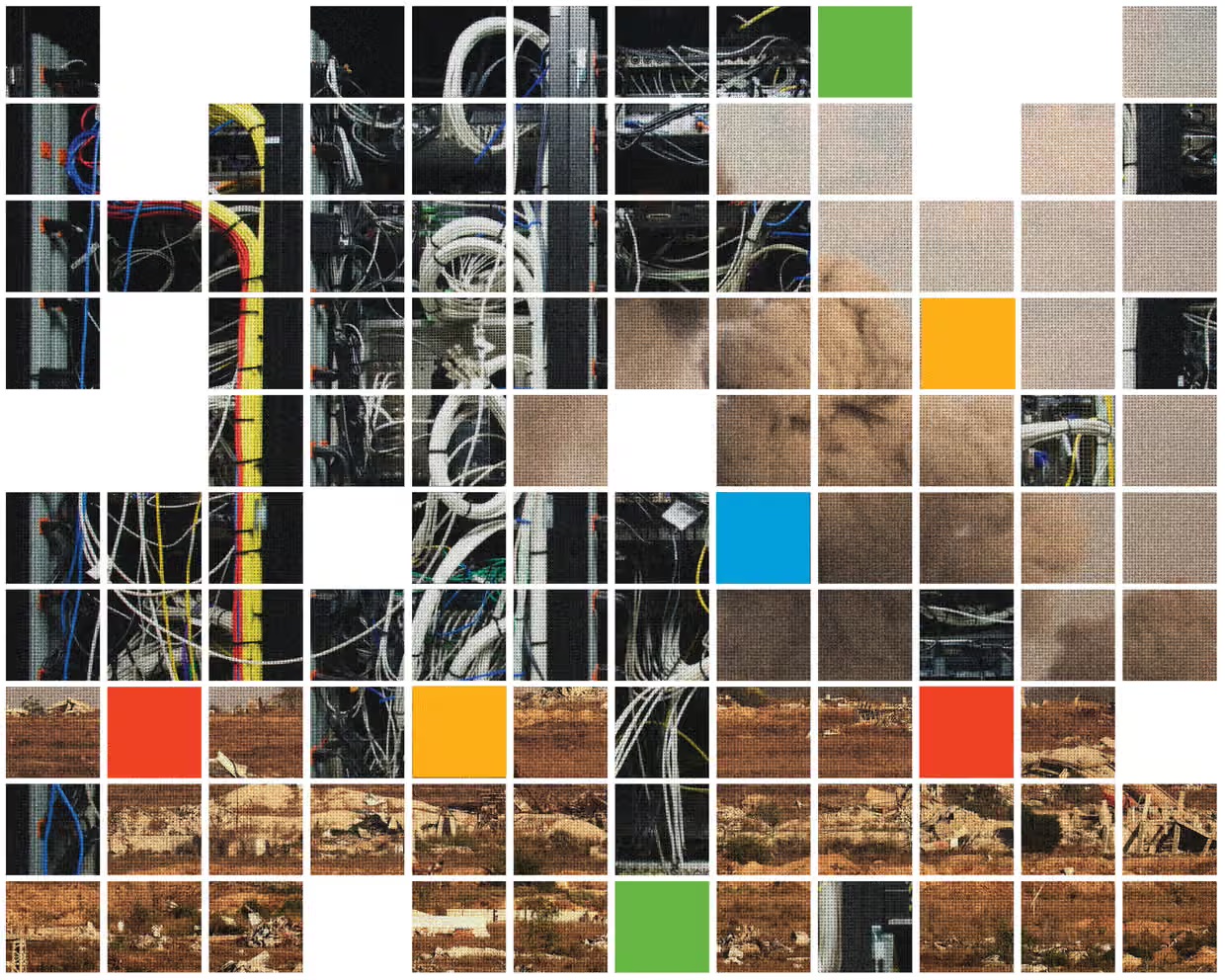Unit 8200’s system collected millions of Palestinian civilian phone calls made each day in Gaza and the West Bank. Illustration: Guardian Design/Alamy/Getty
Microsoft has terminated the Israeli military’s access to technology it used to operate a powerful surveillance system that collected millions of Palestinian civilian phone calls made each day in Gaza and the West Bank, the Guardian can reveal.
Microsoft told Israeli officials late last week that Unit 8200, the military’s elite spy agency, had violated the company’s terms of service by storing the vast trove of surveillance data in its Azure cloud platform, sources familiar with the situation said.
The decision to cut off Unit 8200’s ability to use some of its technology results directly from an investigation published by the Guardian last month. It revealed how Azure was being used to store and process the trove of Palestinian communications in a mass surveillance programme.
In a joint investigation with the Israeli-Palestinian publication +972 Magazine and the Hebrew-language outlet Local Call, the Guardian revealed how Microsoft and Unit 8200 had worked together on a plan to move large volumes of sensitive intelligence material into Azure.
The project began after a meeting in 2021 between Microsoft’s chief executive, Satya Nadella, and the unit’s then commander, Yossi Sariel.
In response to the investigation, Microsoft ordered an urgent external inquiry to review its relationship with Unit 8200. Its initial findings have now led the company to cancel the unit’s access to some of its cloud storage and AI services.
Equipped with Azure’s near-limitless storage capacity and computing power, Unit 8200 had built an indiscriminate new system allowing its intelligence officers to collect, play back and analyse the content of cellular calls of an entire population.
The project was so expansive that, according to sources from Unit 8200 – which is equivalent in its remit to the US National Security Agency – a mantra emerged internally that captured its scale and ambition: “A million calls an hour.”
According to several sources, the enormous repository of intercepted calls – which amounted to as much as 8,000 terabytes of data – was held in a Microsoft datacentre in the Netherlands. Within days of the Guardian publishing the investigation, Unit 8200 appears to have swiftly moved the surveillance data out of the country.
According to sources familiar with the huge data transfer outside of the EU country, it occurred in early August. Intelligence sources said Unit 8200 planned to transfer the data to the Amazon Web Services cloud platform. Neither the Israel Defense Forces (IDF) nor Amazon responded to a request for comment.
The extraordinary decision by Microsoft to end the spy agency’s access to key technology was made amid pressure from employees and investors over its work for Israel’s military and the role its technology has played in the almost two-year offensive in Gaza.
A United Nations commission of inquiry recently concluded that Israel had committed genocide in Gaza, a charge denied by Israel but supported by many experts in international law.
The Guardian’s joint investigation prompted protests at Microsoft’s US headquarters and one of its European datacentres, as well as demands by a worker-led campaign group, No Azure for Apartheid, to end all ties to the Israeli military.

On Thursday, Microsoft’s vice-chair and president, Brad Smith, informed staff of the decision. In an email seen by the Guardian, he said the company had “ceased and disabled a set of services to a unit within the Israel ministry of defense”, including cloud storage and AI services.
Smith wrote: “We do not provide technology to facilitate mass surveillance of civilians. We have applied this principle in every country around the world, and we have insisted on it repeatedly for more than two decades.”
The decision brings to an abrupt end a three-year period in which the spy agency operated its surveillance programme using Microsoft’s technology.
Unit 8200 used its own expansive surveillance capabilities to intercept and collect the calls. The spy agency then used a customised and segregated area within the Azure platform, allowing for the data to be retained for extended periods of time and analysed using AI-driven techniques.
Although the initial focus of the surveillance system was the West Bank, where an estimated 3 million Palestinians live under Israeli military occupation, intelligence sources said the cloud-based storage platform had been used in the Gaza offensive to facilitate the preparation of deadly airstrikes.
The revelations highlighted how Israel has relied on the services and infrastructure of major US technology companies to support its bombardment of Gaza, which has killed more than 65,000 Palestinians, mostly civilians, and created a profound humanitarian and starvation crisis.














